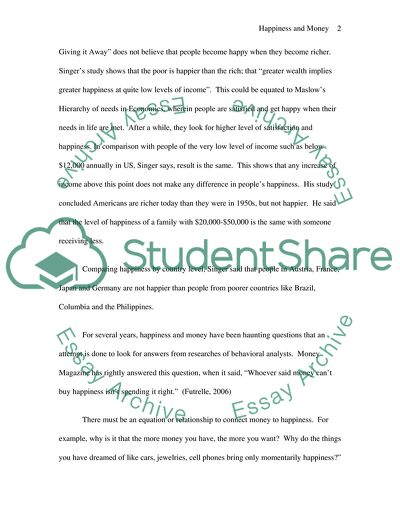
- Home
- Free Samples
- Premium Essays
- Editing Services
- Extra Tools
- Essay Writing Help
- About Us
- Studentshare
- Subjects
- Miscellaneous
- Happiness and Money
Happiness and Money - Essay Example

- Subject: Miscellaneous
- Type: Essay
- Level: Undergraduate
- Pages: 4 (1000 words)
- Downloads: 0
- Author: deionschowalter
Extract of sample "Happiness and Money"
Beyond that, your satisfaction and excitement goes down, and any more increase does not make any difference. A graphical illustration of satisfaction level is illustrated below: Several studies have been done to know what makes people happy, is money one of them? Peter Singer who has conducted several researches on “Happiness, Money and Giving it Away” does not believe that people become happy when they become richer. Singer’s study shows that the poor is happier than the rich; that “greater wealth implies greater happiness at quite low levels of income”.
This could be equated to Maslow’s Hierarchy of needs in Economics, wherein people are satisfied and get happy when their needs in life are met. After a while, they look for higher level of satisfaction and happiness. In comparison with people of the very low level of income such as below $12,000 annually in US, Singer says, result is the same. This shows that any increase of income above this point does not make any difference in people’s happiness. His study concluded Americans are richer today than they were in 1950s, but not happier.
He said that the level of happiness of a family with $20,000-$50,000 is the same with someone receiving less. For several years, happiness and money have been haunting questions that an attempt is done to look for answers from researches of behavioral analysts. Money Magazine has rightly answered this question, when it said, “Whoever said money can’t buy happiness isn’t spending it right.” (Futrelle, 2006) There must be an equation or relationship to connect money to happiness. For example, why is it that the more money you have, the more you want?
Why do the things you have dreamed of like cars, jewelries, cell phones bring only momentarily happiness?” This kind of money-happiness relationship is explained by the new science of happiness starting with a simple insight, “We’re never satisfied.” (Futrelle)
...Download file to see next pages Read MoreCHECK THESE SAMPLES OF Happiness and Money
The Case against Money and Happiness
Family Values In The Rocking-Horse Winner
Wealth and Happiness
Money and happiness in the attachment
Kids + Money and Moneyless in Moab Documentaries
Analysis Paper - Socialization and the family
Money and Happiness
Money Does Not Buy Happiness

- TERMS & CONDITIONS
- PRIVACY POLICY
- COOKIES POLICY